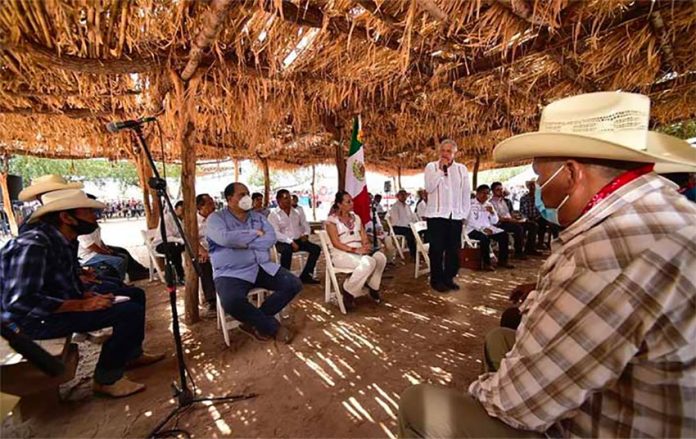President López Obrador announced on Thursday the creation of a justice commission for the Yaqui indigenous people which will be responsible for returning expropriated land to them, delivering basic services and rerouting a gas line.
The president made the announcement during a meeting in Vícam, Sonora, with the leaders of eight Yaqui towns in the northern border state.
He also apologized to the Yaqui people for repression committed by previous governments, indicating that Mexico owes a large debt to the indigenous community.
Residents of the towns have blocked train tracks and a highway in recent weeks to demand that the government compensate them for ceding land for a range of infrastructure projects and fulfill social development commitments.
Accompanied by a group of high-ranking government officials, López Obrador told the community leaders that his administration wants to deliver justice to the Yaqui people.
“That’s why I’m here with the cabinet members,” he said, noting that agricultural, water, welfare and indigenous rights officials were with him.
The president said that officials from those areas would be members of the justice commission and work to turn the government’s good intentions into deeds.
“I will preside over the justice commission … and my stand-in will be Adelfo Regino, general director of the National Institute of Indigenous Peoples,” López Obrador said.
Land that the Yaquis lost as the result of a land redistribution carried out by former president Lázaro Cárdenas 80 years ago will be returned, the president said.
He said the commission would investigate to determine who is occupying the land the Yaquis lost and whether they have papers proving ownership.
López Obrador said there are many ways to resolve the situation including restitution via presidential order and payment of compensation.
The president also committed to delivering reliable water services to the eight Yaqui towns as well as improving drainage, healthcare, education, housing and public spaces.
In addition, he said that the Guaymas-El Oro gas pipeline will be diverted so that it doesn’t run through Yaqui land.
Construction of the pipeline has been stalled since 2017 due to the opposition from residents of Bácum, one of the eight Yaqui towns.
López Obrador concluded his meeting with the community leaders by thanking them for their confidence and assuring them that his government wouldn’t betray or fail them.
“We will fulfill all the commitments; it’s not just for you, it’s historical justice, delivering justice to the people,” he said.
At least one Yaqui leader who attended the meeting wasn’t convinced that the president would keep his word.
Alfonso Valenzuela, Sonora leader of the National Union of Autonomous Regional Farmers Organizations, told the Reforma newspaper that López Obrador offered “a lot of words” but didn’t sign anything to back them up. He described the meeting with the president as “a lost opportunity.“
As López Obrador was smoking the peace pipe with the Yaqui leaders, other members of the Yaqui community blocked federal Highway 15 between Guaymas and Ciudad Obregón.
Source: El Universal (sp), Reforma (sp)
